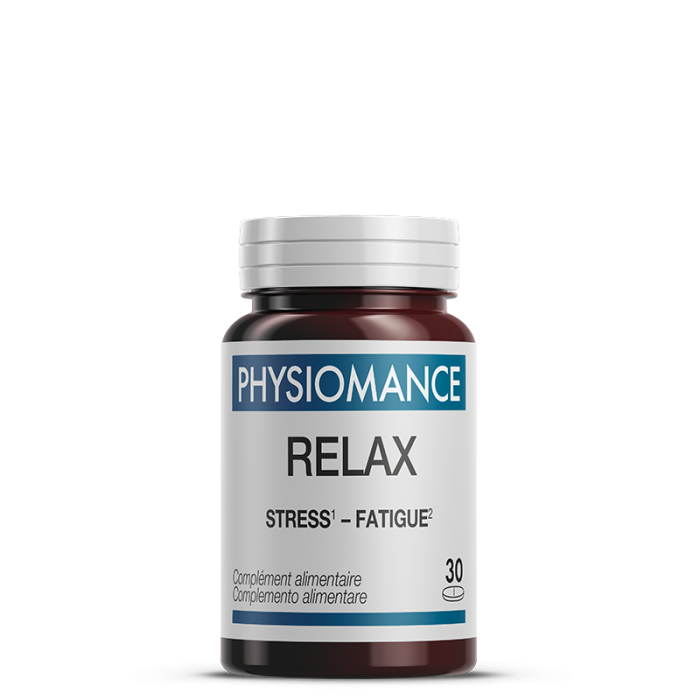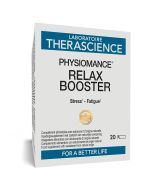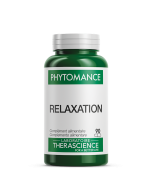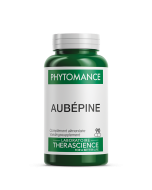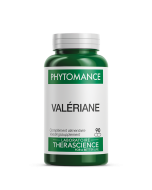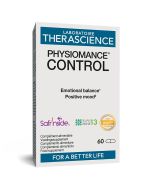PHYSIOMANCE® Relax is a formula designed and developed in partnership with Professor Anne-Marie Roussel (Emeritus Professor of Nutritional Biochemistry, Faculty of Pharmacy - Grenoble Alpes University). PHYSIOMANCE® Relax has been the subject of extensive research and development work to create a solution specially designed to combat stress.
PHYSIOMANCE® RELAX contains in 3 tablets :
- 60 mg of bacopa, a traditional ayurvedic plant, which helps to relieve and prevent stress and may have a positive effect on the cerebral system. Bacopa would also be likely to improve concentration and memory ;
- 300 mg of magnesium, in the form glycerophosphate and citrate, for optimal absorption. In addition to its contribution to psychological functions, magnesium contributes to the normal functioning of the nervous system and energy metabolism. Its anti-fatigue action is also recognised ;
- 100% of the reference intake of vitamins B3, B6, B9 and B12, which contribute to the normal functioning of the nervous system. Vitamins B3, B6, B9 and B12 help to reduce fatigue ;
- 150 mg of L-taurine, an essential amino acid, 71.4 mg of grape seed extract titrated to 50 mg of grape OPC*, 150 mg of rutin extracted from Sophora japonica, to complete the formula.
*OPC: Oligomeric Proanthocyanidins
Why choose PHYSIOMANCE® RELAX from the THERASCIENCE Laboratory ?
Stress is a natural reaction triggered by the body to deal with situations perceived as threatening or difficult to manage. Its causes can be psychological and emotional (stress at work, divorce, bereavement, children leaving home, etc.), environmental (physical overwork, pollution, noise, heatwave) or due to the current political and economic context. Stress can cause symptoms such as fatigue, anxiety, irritability, hyper-emotionality, sleep disorders, as well as physiological problems (headaches, gastrointestinal problems, muscular tension).
When stress persists at a high level, we speak of chronic stress. Over the long term, the physiological reactions induced by stress can have a number of deleterious effects. Chronic stress is accompanied by hormonal changes (a drop in cortisol and dopamine) and a loss of magnesium.
In the long term, stress is responsible for a phase known as exhaustion, caused by a breakdown in cellular equilibrium and damage to the cardiovascular, digestive, nervous and immune systems. According to a study by the Institut National de Recherche et de Sécurité (INRS), nearly 200,000 new illnesses in France are directly caused by stress.
5 key reasons to star a cure of PHYSIOMANCE® Relax to tackle stress
- ANTI-STRESS ALLIANCE: PHYSIOMANCE® Relax is an innovative formula to combat stress and fatigue and support the body's resistance, thanks to a combination of 3 bio-actives (bacopa, rutin, grape polyphenols), magnesium, taurine and a micronutritional complex.
- 5 COMPLEMENTARY ACTIONS: PHYSIOMANCE® Relax helps to reduce stress (bacopa), ease tension, contribute to physical relaxation and promote perspective and serenity (magnesium and vitamins B3 B6 B9 B12).
- PHYSICAL AND MENTAL RELAXATION: Magnesium and vitamins B3, B6, B9 and B12 contribute to the proper functioning of the nervous system and help reduce fatigue, while also contributing to energy metabolism.
- OPTIMAL BIODISPONIBILITY: For maximum effectiveness, THERASCIENCE has selected active ingredients in the molecular forms most easily assimilated by the body: magnesium glycerophosphate and citrate and coenzymated vitamins B6, B9 and B12.
- THERASCIENCE TRANSPARENCY: PHYSIOMANCE® Relax has the Clean LABEL guaranteeing a product with NO colouring agents, NO preservatives, NO nanoparticles and NO gluten- or lactose-based ingredients. What's more, the plant extracts in its formula are High Quality Process® certified, attesting to their origin, quality and effectiveness. PHYSIOMANCE® Relax is made in France and is not tested on animals.
Why choose PHYSIOMANCE® RELAX from Laboratoire THERASCIENCE ?
1. Scientifically selected ingredients
MAGNESIUM
Magnesium is one of the most abundant minerals in the body. In the diet, magnesium is found in dark chocolate, pulses (lentils, beans, peas), oleaginous fruits (almonds and walnuts) and wholegrain cereals. According to Vidal, daily magnesium requirements are 360 mg for a woman and 420 mg for a man.2
However, even a well-balanced diet is not enough to cover the necessary daily intake of magnesium. That's why health professionals often recommend taking a magnesium supplement to replenish reserves.
Magnesium is essential for the body to function properly and is involved in over 300 metabolic reactions. This mineral is mainly present in the bones, muscles and brain. What's more, around 98% of magnesium is present within the cells themselves.
Magnesium has many functions and :
- Helps reduce fatigue
- Contributes to a normal energy metabolism
- Ensures normal psychological functions
- Contributes to the normal functioning of the nervous system
- Contributes to normal muscle function
- Helps maintain normal bones and teeth
Fatigue reduction and energy metabolism
Magnesium is involved in numerous reactions in the body. In particular, it is involved in the production of ATP, the main source of cellular energy, as well as in the synthesis of proteins and DNA, both of which are essential for cells to function properly.
Psychological functions
Magnesium contributes to the release of certain neurotransmitters such as GABA (gamma-aminobutyric acid), known for its calming effect, and serotonin ("happiness hormone"), which explains the beneficial action of magnesium on psychological functions and the nervous system. GABA acts as a brake in the nervous system, reducing the excitability of neurons and promoting relaxation. It plays an essential role in regulating brain activity and is involved in various neurological processes, such as modulating anxiety, stress and sleep. Its inhibitory action helps to maintain a functional balance in the nervous system by controlling the electrical and chemical signals between nerve cells.
Immunity and vitamin D
Magnesium also plays an important role in the immune system and the production of vitamin D. Vitamin D is crucial for activating the immune cells involved in the body's defence against infection.
Bone and muscle function
Magnesium also promotes healthy bone mineralisation. It contributes to the binding of calcium, thus reinforcing bone strength and density.
Magnesium also contributes to muscle relaxation, helping to prevent cramps. Magnesium and calcium work in synergy to maintain optimal muscle function.
The major SUVIMAX epidemiological study carried out on more than 13,000 French people showed that 75% of adults suffer from a magnesium deficiency.3 Certain factors, such as digestive disorders, taking certain medicines, stress, ultra-processed food and alcohol consumption, exacerbate this deficiency.
A lack of magnesium is not without consequences for the body, especially as a lack of magnesium leads to more stress... A vicious circle is set in motion. The more stress there is, the more magnesium is eliminated from the body; and the more magnesium is lacking, the more the body's stress level increases, leading to fatigue, anxiety, nervousness, migraines, cramps...
That's why the first anti-stress reflex to adopt is to increase your daily intake of magnesium!
However, not all forms of magnesium are created equal. In fact, so-called "inorganic" magnesium salts such as magnesium oxide or marine magnesium have very low bioavailability, meaning that they are not absorbed by the body and also cause digestive problems.
This is why Laboratoire THERASCIENCE has selected magnesium citrate and glycerophosphate, which are among the best bioavailable forms. These two forms of magnesium are well assimilated by the body and very well tolerated. PHYSIOMANCE® Relax provides 300 mg of magnesium per day, i.e. 80% of daily requirements, which is the ideal dose for replenishing magnesium reserves!
TAURINE
PHYSIOMANCE® Relax provides 150 mg of taurine, an amino acid with a "magnesium-fixing" effect to facilitate the entry of magnesium into the cells.
Taurine also has muscle-relaxing properties. It also plays an important role in the nervous system. Taurine is involved in the production of GABA, which promotes relaxation and regulates neuronal excitability.
BACOPA
Also known as brahmi, bacopa is a fatty plant that has been used for 3,000 years in traditional Ayurvedic medicine to stimulate the brain and improve memory, attention and learning.
Its leaves contain numerous active ingredients such as flavonoids, alkaloids and triterpenic saponosides, including bacosides A and B, bacopa's most active molecules.
Bacopa :
- Helps relieve and prevent stress
- Helps to manage stress
- Improves resistance to stress
- Contributes to relaxation
- Helps to have sweet dreams
- Helps maintain mental balance in stressful circumstances
- Has a positive effect on the cerebral system
- Helps maintain cognitive function
- Promotes concentration and intellectual performance
- Stimulates short- and long-term memory
Effects on stress and relaxation
Bacopa regulates the release of certain stress hormones such as cortisol, helping to promote a state of mental well-being. This plant also increases concentrations of GABA in the brain, thereby reducing neuronal excitability. Modulation of GABA receptors promotes a state of relaxation and calm by reducing excessive nervous activity, which can contribute to anxiety. Bacopa thus helps to regulate stress levels.
Cognitive functions
Stress can have a negative impact on various aspects of cognitive function, including memory, attention, concentration, decision-making and problem-solving.
Bacopa can promote brain plasticity, i.e. the brain's ability to adapt and form new neuronal connections essential for learning, memory and other cognitive functions.
Numerous studies carried out on bacopa have demonstrated its beneficial action on short- and long-term memory. In fact, one clinical study showed that 12 weeks of bacopa supplementation improved cognitive performance, which is often affected by chronic stress.4
The antioxidant molecules in this plant help to combat free radicals, mainly in the cortex and hippocampus, the areas of the brain that play a central role in memory, attention and orientation. By 'trapping' these free radicals, bacopa reduces the oxidative stress that damages cells, thereby exerting a neuroprotective effect.
To help relieve and prevent stress and improve concentration and intellectual performance PHYSIOMANCE® Relax provides 60 mg of bacopa powder.
RUTINE
Rutin is a natural flavonoid derived from quercetin. Rutin is naturally present in many plants, including citrus fruits (especially citrus peel), cherries, apples, asparagus, green tea and Sophora japonica.
Rutin is a powerful antioxidant that helps neutralise free radicals, helping to protect cells against oxidative damage. Several recent studies suggest that rutin exerts a neuroprotective and anxiolytic effect thanks to its antioxidant and anti-inflammatory properties.5 The benefits of flavonoids on mental health have also been demonstrated.6-7 This is why PHYSIOMANCE® Relax provides 150 mg of rutin from the flowers of Sophora japonica for enhanced naturalnes.
GRAPE OPC
ProanthoCyanidolic Oligomers (OPC) are powerful natural molecules present in grape seeds which belong to the family of polyphenols with an antioxidant role. Grape OPCs are renowned for their exceptional ability to neutralise free radicals and protect cells against the effects of oxidative stress.
Grape polyphenols have also been studied for their positive effects on mental health and memory, helping to reduce stress and anxiety. Indeed, studies have shown that the higher the level of flavonoids and polyphenols in the blood, the lower the rise in stress hormones.8
OPCs therefore improve the emotional state (calm, serenity, self-esteem) and help combat anxiety. To enjoy all the benefits of grapes and their active molecules, PHYSIOMANCE® Relax provides 71.4 mg of grape-seed extract with 50 mg of OPC.
MICRONUTRITIONAL COMPLEX
Vitamins B3 (niacin), B6 (pyridoxine), B9 (folic acid) and B12 (cobalamin) belong to the group of so-called "water-soluble" B vitamins, which are not stored by the body. That's why it's essential to get them.
Together, these four vitamins :
- Contribute to the proper functioning of the nervous system
- Help ensure normal psychological functions
- Maintain a normal energy metabolism
- Help reduce fatigue
- Regulate hormonal activity
- Contributes to the normal synthesis of cysteine, the precursor of taurine
- Contributes to normal homocysteine metabolism
Supports the nervous system and psychological functions
Vitamins B3, B6 and B9 are involved in the synthesis of neurotransmitters (dopamine, noradrenaline, serotonin), the brain's chemical messengers. Vitamin B6 also facilitates the conversion of tryptophan, an amino acid provided by the diet, into serotonin. Serotonin is a neurotransmitter essential for regulating mood, emotions and the response to stress.
Vitamin B12 is also essential for nervous system function. It is involved in the production of myelin, a protein that improves the transmission of signals to nerves and neurons.
Action against stress
The properties these vitamins exert on the nervous system explain their anti-stress role. Vitamin B6 is also involved in the production of cysteine, an amino acid that is a precursor to taurine. Taurine and vitamin B6 are considered to be 'magnesium fixers', facilitating the entry of magnesium into cells.
Vitamins B6, B9 and B12 are also involved in the metabolism and reduction of homocysteine, an amino acid that is not a component of proteins, but whose increase has a number of harmful effects on health. High levels of homocysteine are exacerbated by stress.
Metabolic function
Vitamins B3, B6, B9 and B12 are essential for optimal metabolic function. They are involved in the production of energy from nutrients in the diet (carbohydrates, proteins and lipids). When stress increases, the body needs more energy. An intake of vitamins B3, B6, B9 and B12 is therefore essential to provide the body with the extra energy it needs and to reduce fatigue.
3 PHYSIOMANCE® Relax tablets a day cover all the body's requirements of vitamins B3, B6, B9 and B12. To ensure maximum assimilation, vitamins B6, B9 and B12 are present in their most bioavailable coenzyme forms.
2. Complementary action
PHYSIOMANCE® Relax is a complete formula which provides 9 precious bio-actives and nutrients which act in synergy to combat stress and fatigue thanks to :
- 300 mg of magnesium in highly bioavailable form (citrate and glycerophosphate)
- 60 mg bacopa powder
- 150 mg taurine for better magnesium assimilation and 150 mg rutin in natural form
- 71.4 mg grape-seed extract with a high OPC content (50 mg)
- Vitamin B3 and vitamins B6, B9 and B12 in coenzyme form for optimum bioavailability.
3. For our premium quality
Treat yourself to the best with PHYSIOMANCE® Relax and its Clean label THERASCIENCE® which certifies a:
- GMO-FREE
- NO nanoparticles
- NO colouring agents
- gluten and lactose-free ingredients
- Not tested on animals
- Made in FRANCE.
PHYSIOMANCE® Relax has also been awarded the High Quality Process® label, which certifies the quality, origin and selection of our plants.
4. A carefully thought-out formula
Our formula, designed and developed in partnership with Professor Anne-Marie Roussel (Emeritus Professor of Nutritional Biochemistry, Faculty of Pharmacy - Grenoble Alpes University), has been the subject of in-depth research and development work to create a solution specially adapted to combat stress.
Bibliography
1. https://www.inrs.fr/risques/stress/consequences-entreprise.html
2. https://www.vidal.fr/parapharmacie/complements-alimentaires/magnesium.html
3. Hercberg S et al ; The SUVIMAX Study : a randomized, placebo-controlled trial of the health effects of antioxydant vitamins and minerals. Arch Intern Mad 2004
4. Rao V et al. A randomized, double-blind, placebo-controlled pilot study of aprobiotic in emotional symptoms of chronic fatigue syndrome. Gut Pathog 2009 Mar 19; 1(1):6.
5. Enogieru A. B. et al. Rutin as a Potent Antioxidant: Implications for Neurodegenerative Disorders. Oxidative Medicine and Cellular Longevity, 2018, 1–17
6. Spencer JPE. Food for thought: the rôle of dietary flavonoids in enhancing human memory, learning and neurocognitive performance. Proceedings of the Nutrition Society. 2008; 67(2):238-252.
7. Bell L et al. A review of the cognitive effects observed in humans following acute supplementation with flavonoids and their associated mechanisms of action. Nutrients, 2015; 7(12):10290-10306.
8. Wirtz P et al. Dark chocolate intake buffers stress reactivity in humans. J Am Coll Cardiol 2014; 63 (21):2297-9











